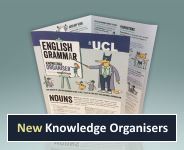Topic: Word class
These resources relate to word classes (traditionally known as 'parts of speech'). Words are grouped into different classes, such as noun and verb, on the basis of their behaviour: where they occur in relation to other words and what they do within sentences.
Englicious contains many resources for English language in schools, but the vast majority of them require you to register and log in first. For more information, see What is Englicious?

